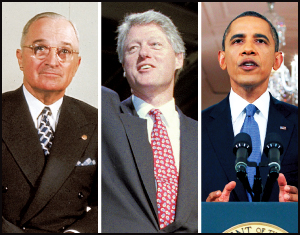Louis Fisher

June 26, 2006 | National Law Journal
State Your SecretsWhen the government asserts a privilege for state secrets, judges must make the call, contends Louis Fisher.
By Louis Fisher
10 minute read

July 14, 2008 | National Law Journal
Why classify legal memos?On March 14, 2003, John Yoo of the Justice Department issued a memo explaining the legal principles for interrogating suspected terrorists. On March 31, 2008, it was declassified. If it consisted of legal reasoning alone, why was it classified? No reference is made to anything that looks like sources or methods, the standard justification for classification. A society cannot remain faithful to the rule of law when governed by secret legal memos, especially those that promote unchecked presidential power.
By Louis Fisher / Special to The National Law Journal
5 minute read
December 27, 2004 | National Law Journal
Hijack in BerlinA quarter-century ago, an American judge in Berlin refused to be bullied. Louis Fisher tells a Cold War tale that anticipates the constitutional concerns of today.
By Louis Fisher
9 minute read

July 04, 2011 | National Law Journal
Parsing the war powerPresidents Truman, Clinton and Obama have all gone to great lengths to argue to Congress and the public that clearly hostile military operations are neither wars nor hostilities.
By Louis Fisher
6 minute read

October 01, 2007 | National Law Journal
A view from insideJack Goldsmith, who once headed the DOJ's Office of Legal Counsel, provides, in The Terror Presidency: Law and Judgment Inside the Bush Administration, a welcome insider's analysis of policy discussions and legal interpretations after the attacks of Sept. 11, 2001. While he offers a confusing account of the administration's attitude on the rule of law, he is more blunt and consistent about OLC's "torture memos," stating that they "seemed more an exercise of sheer power than reasoned analysis."
By Louis Fisher / Special to The National Law Journal
5 minute read
July 31, 2006 | National Law Journal
Invoke it at a costThe state secrets privilege should be treated as qualified, not absolute. Otherwise there is no adversary process in court, no exercise of judicial independence over available evidence and no fairness accorded to private litigants who challenge the government.
By Louis Fisher/Special to The National Law Journal
5 minute read

January 21, 2013 | National Law Journal
What grounds for secrecy?Recent decision denying plaintiffs access to legal memos supporting the Obama administration's conduct of targeted drone strikes on suspected terrorists is deeply troubling.
By Louis Fisher
6 minute read

September 10, 2012 | National Law Journal
Enlarging executive powerFederal Circuit ruling puts many federal employees at risk.
By Louis Fisher
5 minute read

February 21, 2011 | National Law Journal
Crush videos: a constructive dialogueAfter the Supreme Court found a 1999 animal cruelty law unconstitutional last year, Congress responded by enacting a new law that rectified the deficiencies.
By Louis Fisher
5 minute read

July 28, 2008 | National Law Journal
When the Shooting StartsJames Baker III and Warren Chris�topher have a new solution to the ongoing dispute over how the United States decides to go to war. Unfortunately, writes Louis Fisher, the National War Powers Commission's report falls far short in either offering a practical solution to the war powers debate or protecting the rule of constitutional law.
By Louis Fisher
10 minute read
Trending Stories
- 1Stars and Gripes: Merging Firms Need a ‘Superstar Culture’ for US Success
- 2Elaine Darr Brings Transformation and Value to DHL's Business
- 3How Marsh McLennan's Small But Mighty Legal Innovation Team Builds Solutions That Bring Joy
- 4When Police Destroy Property, Is It a 'Taking'? Maybe So, Say Sotomayor, Gorsuch
- 5New York Top Court Says Clickwrap Assent Binds Plaintiff's Personal-Injury Claim to Arbitration in Uber Case
More from ALM
- Legal Speak at General Counsel Conference East 2024: Match Group's Katie Dugan & Herrick's Carol Goodman 1 minute read
- Legal Speak at General Counsel Conference East 2024: Eric Wall, Executive VP, Syllo 1 minute read
- Legal Speak at General Counsel Conference East 2024: Virginia Griffith, Director of Business Development at OutsideGC 1 minute read



